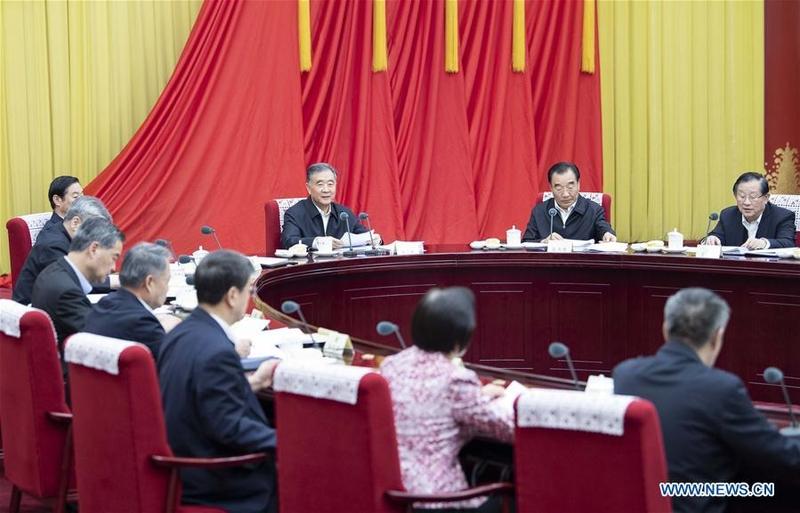 Wang Yang, a member of the Standing Committee of the Political Bureau of the Communist Party of China Central Committee and chairman of the Chinese People's Political Consultative Conference National Committee, presides over the 32nd chairman and vice chairpersons' meeting of the 13th CPPCC National Committee, in Beijing, Jan 17, 2020. (PHOTO / XINHUA)
Wang Yang, a member of the Standing Committee of the Political Bureau of the Communist Party of China Central Committee and chairman of the Chinese People's Political Consultative Conference National Committee, presides over the 32nd chairman and vice chairpersons' meeting of the 13th CPPCC National Committee, in Beijing, Jan 17, 2020. (PHOTO / XINHUA)
That the National People's Congress Standing Committee, China's top legislature, and the Chinese People's Political Consultative Conference National Committee, the country's top political advisory body, are considering postponing their annual sessions that are usually held in March is a pragmatic move at a time when the country is still battling the novel coronavirus, about which more still needs to be known.
Although the number of people in the country outside of Hubei province that have been infected by the virus had dropped for 13 days in a row as of Monday, it is still too early to claim that the situation has been brought under control, and the nation cannot relax its vigilance.
Not to mention that the fight against the virus in Hubei — particularly its capital Wuhan where the death toll accounts for more than 70 percent of the national total — remains an uphill battle.
Given that the two sessions would see thousands of lawmakers and political advisers from across the country descend on Beijing, not to mention the reporters and meeting service staff that would also be in attendance, it is natural that the NPC Standing Committee and the CPPCC National Committee should deliberate on whether they should delay their annual sessions since the country is still discouraging gatherings in a bid to stop person-to-person transmission of the virus.
Since one-third of the 3,000 NPC delegates are provincial and municipal-level cadres with important leadership roles on the front line of the battle against the virus, their work is directly related to the epidemic control and prevention work.
The proposed postponement is another sign of the country's resolute determination to win the fight against the virus, which, as the World Health Organization has said, has helped prevent large spillover effects to other countries.
The fight to contain the epidemic is in a critical stage, but China is also fighting another battle to revive the momentum of its economy, which is obviously also of great importance to the world economy. How to steer the world's second-largest economy through the choppy waters of the epidemic is a severe test for China's decision-makers.
With China's ongoing cooperation with the WHO, the resumption of industries and business, and the understanding and support of the whole nation, the country's efforts to end the epidemic will pay off.
But there are many lessons that need to be learned from the outbreak of the novel coronavirus and China's response to the epidemic. The NPC delegates and CPPCC National Committee members must reflect on how and why the people's war needed to be fought, and the shortcomings in the governance system that have revealed, so that they can contribute to improving and further modernizing the country's governance capacities.


